7 Modern Watches Inspired by Historical Pieces - WatchTime

The vintage-look trend that has been so prevalent in the watch world in recent years has showed no signs of abating. Modern re-editions of historical pieces continue to emerge from some of the most venerable watch brands. Here are seven notable examples of “vintage-inspired” watches launched in recent years.
1. Omega Globemaster
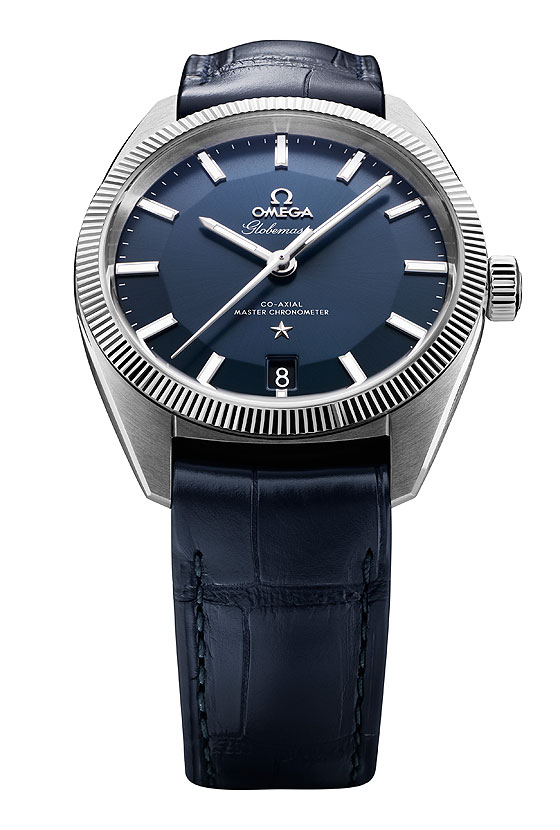
The Omega Globemaster — the first watch to receive the brand’s “Master Chronometer” certification — is technically a new model in the Omega portfolio, but it gets its design cues from earlier models: the “pie pan” dial echoes that of a vintage Omega Constellation from 1952; and the fluted bezel is derived from that of another Constellation model from 1968. The 39-mm case (available in stainless steel, yellow gold, two-tone steel and yellow gold, and Omega’s proprietary Sedna gold) has a brushed finish, with two polished bevels connecting the edges of the lugs to the bezel. The top ridges of the fluted bezel have a smoothed finish. The “Master Chronometer” movement, Caliber 8900, meets not only the strict precision requirements of Swiss testing agency COSC, but additional standards established by Omega and METAS, the Swiss Federal Institute of Metrology, which include functioning while exposed to magnetic fields up to 15,000 Gauss.
2. Tudor North Flag
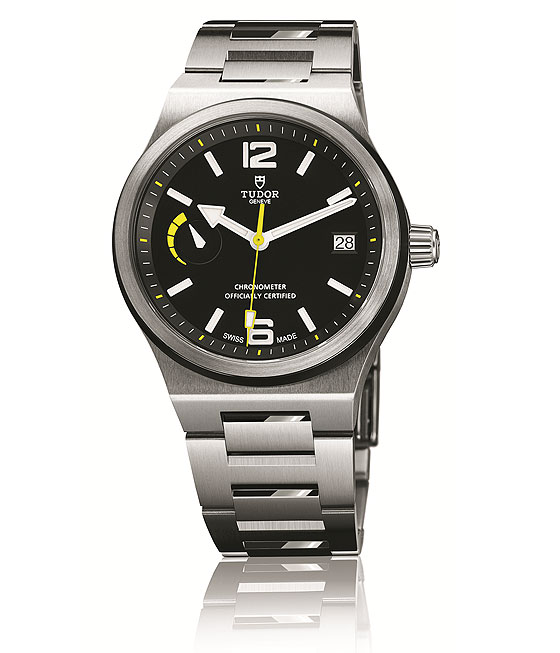
The Tudor North Flag derives its name and design inspiration from the British North Greenland Expedition in the early 1950s, in which members of the expedition team wore circa-1952 Tudor Oyster Prince models. These “tool watches” were instrumental in carrying out this exploratory mission to some of the earth’s harshest climatic conditions. The North Flag owes some of its “scientific equipment” look to these early watches: a satin-brushed steel case (40 mm in diameter) with ergonomic curves, highlighted by a bezel composed of matte ceramic on one side and brushed steel on the other, along with a conical winding crown that screws down for a 100-meter water resistance. The caseback features a sapphire window through which one can view the movement, automatic Caliber MT5621, which also happens to be the brand’s first in-house-made movement.
3. Breitling Transocean Chronograph 1915
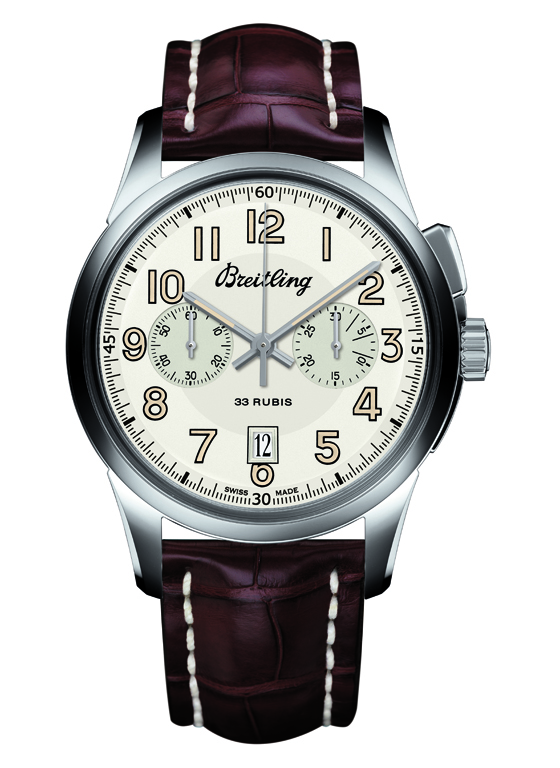
The Breitling Transocean Chronograph 1915 marks the 100th anniversary of a major design innovation that we too often take for granted on contemporary chronographs. In the early 20th century, all chronographs were monopushers, with the controls for starting, stopping, and returning the timer to zero all placed in the crown. In 1915, Gaston Breitling, son of founder Léon Breitling, designed a timing watch with a separate pusher to control the start, stop and reset functions. He placed it on the side of the case at 2 o’clock, just above the crown. The 2 o’clock positioning would soon become standard, as it was easy to reach and control on the wrist. This limited edition watch plays off of these roots, updating them for a dial and case design in keeping with the Transocean collection. An angled pusher sits at 2 o’clock, above the fluted crown. The silvered dial has a bicompax display: a small-seconds subdial is at 9 o’clock and a 30-minute counter at 3 o’clock. The watch is fitted with an all-new manufacture movement, Caliber B14, which is manually wound and Chronometer-certified by COSC.
4. Longines Pulsometer Chronograph
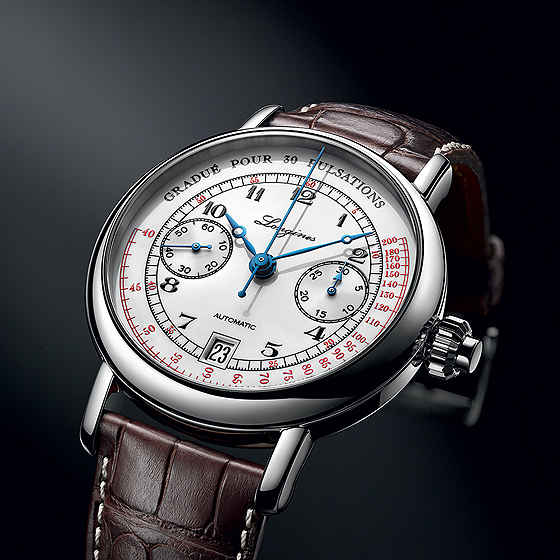
A watch from the 1920s provided the template for the Longines Pulsometer Chronograph, a timepiece whose primary function was intended for use by medical professionals. The so-called “doctor’s watch” has a pulsometric scale printed in red around the periphery of the lacquered, white dial. Used in conjunction with the sweeping chronograph hand (which is operated by a monopusher in the crown), the scale enables the wearer to measure one’s heartbeat in a simple and reliable manner. The 40-mm steel case has a sapphire crystal in the front and back and contains the Longines-exclusive L788.2 movement, developed by ETA, which is outfitted with a column-wheel chronograph and holds a power reserve of 54 hours.
5. Patek Philippe Calatrava Pilot Travel Time Ref. 5524
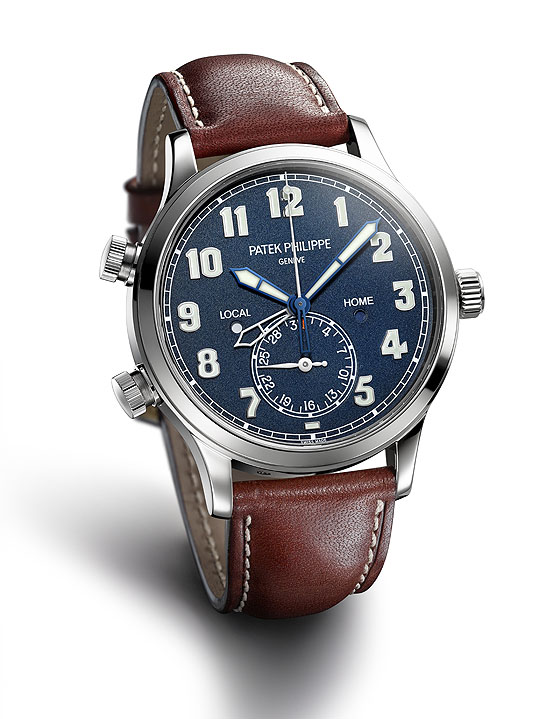
As many watch enthusiasts are aware, Patek Philippe has a long history in world-time watches, developing its first “Heure Universelle” timepieces with famous watchmaker Louis Cottier, in 1930 and awarded a patent for its original “Travel Time” mechanism in 1959. What fewer may know is that the brand also has a history in aviation, developing notable “siderometer” (or “hour angle”) wristwatches back in the early days of flight, two of which are now on display in Patek’s museum in Geneva and serve as the inspiration for the Patek Philippe Calatrava Pilot Travel Time Ref. 5524. This very unconventional Patek watch has the look of an early-20th-century pilots’ watch (albeit one in a white-gold case) and is equipped with Patek’s Caliber 324 S C FUS, with an easy-to-use and aviator-friendly second-time-zone function. Aesthetic touches include the dark navy blue dial, inspired by the body paint of 1930s American fighter planes, and the vintage brown calfskin leather strap with contrast top-stitching, reminiscent of the leather belts worn by 1930s pilots.
6. Seiko Grand Seiko 62GS
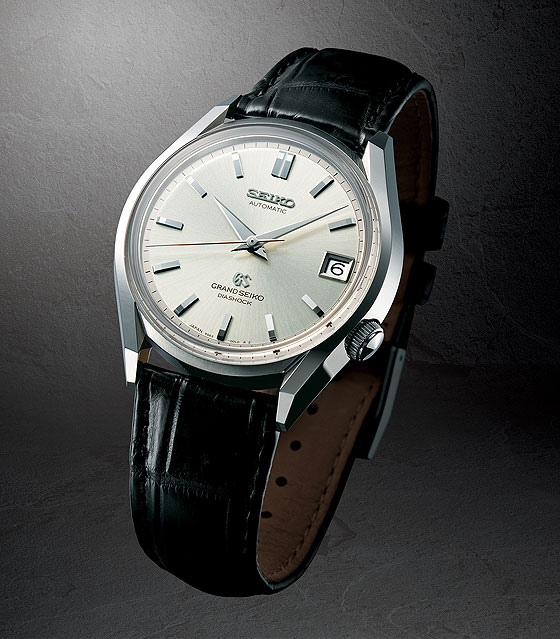
The Seiko Grand Seiko 62GS is based upon the very first Grand Seiko watch with an automatic movement, released in 1967. Following up on the previous two Grand Seiko Historical Collection releases — the re-imagined 44GS in 2013 and the 1964 “Self Dater” last year — the recreation of the 62GS is highly reminiscent of the original, which fans of the brand fondly remember for its mirrored, multi-sided case (achieved with Seiko’s “Zaratsu polishing”); large “bezel free” dial opening; long, sharply edged hands typical of the Grand Seiko line; and recessed crown at 4 o’clock, a clever means to convey to the watch’s owner that hand-winding was not required. It is powered by Seiko’s mechanical Caliber 9S65, with automatic winding and a 72-hour power reserve. Inherited features from the original watch include the lion emblem on the caseback and “Diashock” logo (referring to Seiko’s shock protection technology) on the dial.
7. Oris Diver Sixty-Five
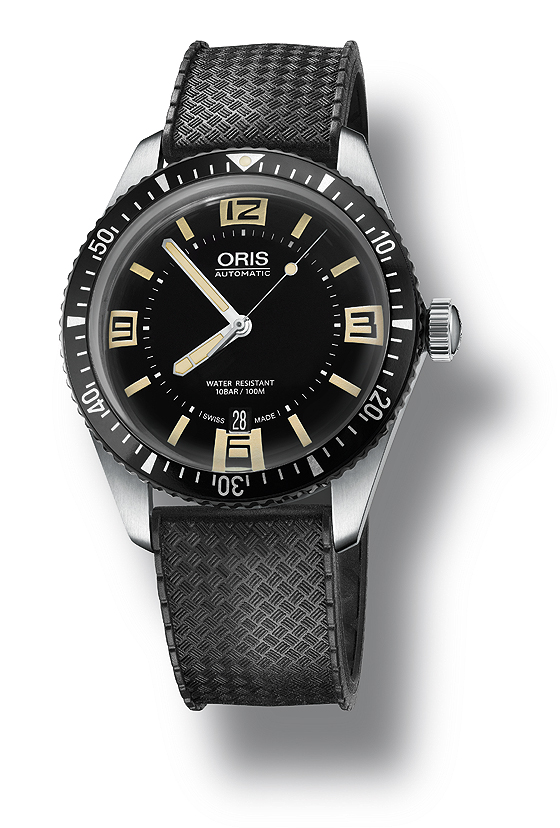
The Oris Diver Sixty-Five revives the look of an Oris dive watch released 50 years ago and gives it a 21st century makeover. The 1965 model had a chromium-plated brass case and plexiglas crystal, a bidirectional rotating bezel, and a black plastic strap, while the new version has a larger, more contemporary 40-mm case in corrosion-resistant stainless steel; a scratch-resistant, nonreflective sapphire crystal with a “bubble-curved” shape; and a safer (for diving) unidirectional bezel. The bezel of the Diver Sixty-Five is enhanced with a very of-the-moment black aluminum inlay, and the hands and indices (filled with tritium on the original model) are filled with a type of Super-LumiNova called “Light Old Radium” whose beige glow contrasts nicely with the black dial in the dark. The steel caseback is engraved with the same historical Oris emblem found on the original’s, the crown screws down to ensure a water-resistance to 100 meters, and the modern version is available on a black textile NATO strap and steel bracelet as well as a rubber strap. The movement is Oris’s automatic Caliber 733, which is based on a Sellita SW200.












